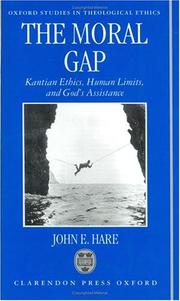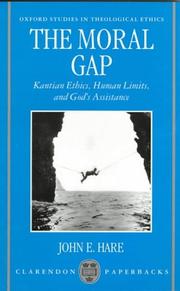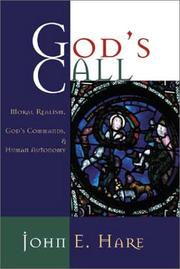| Listing 1 - 8 of 8 |
Sort by
|

ISBN: 0198263813 Year: 1996 Volume: *1 Publisher: Oxford New York Clarendon Press Oxford University Press
Abstract | Keywords | Export | Availability | Bookmark
 Loading...
Loading...Choose an application
- Reference Manager
- EndNote
- RefWorks (Direct export to RefWorks)
Apologetics --- Apologetics [Missionary ] --- Apologetics--19th century --- Apologetics--20th century --- Apologetiek --- Apologetiek--19e eeuw --- Apologetiek--20e eeuw --- Apologétique --- Apologétique--19e siècle --- Apologétique--20e siècle --- Christelijke ethiek --- Christelijke geloofswaarheden --- Christelijke waarheiden --- Christendom--Apologetische literatuur --- Christendom--Geloofswaarheden --- Christian ethics --- Christian evidences --- Christianisme--Morale --- Christianisme--Vérités de foi --- Christianity--Apologetic works --- Christianity--Evidences --- Ethics [Modern ] --- Ethiek [Moderne ] --- Ethique chrétienne --- Ethique moderne --- Etres humains --- Evidences [Christian] --- Evidences of christianity --- Fundamentele theologie --- Geloofswaarheden [Christelijke ] --- Genade (Theologie) --- Grace (Theology) --- Grâce (Théologie) --- Homme (Humanité) --- Homme (Théologie chrétienne) --- Hommes (Humanité) --- Human beings --- Humanité (Ensemble des êtres humains) --- Humans --- Man (Christian theology) --- Mankind --- Mens --- Mens (Christelijke theologie) --- Mensdom --- Mensen --- Mensheid (Geheel der mensen) --- Moraaltheologie --- Moral theology --- Morale chrétienne --- Polemics (Theology) --- Polemieken (Theologie) --- Preuves du Christianisme --- Theologie [Fundamentele ] --- Theologie [Moraal] --- Theology [Fundamental] --- Theology [Moral ] --- Théologie de la grâce --- Théologie fondamentale --- Théologie morale --- Vérités de foi (Christianisme) --- Waarheden [Christelijke ] --- Ethics, Modern --- Man --- #GBIB:Overlegcentrum Christelijke Ethiek --- 241 --- Homo sapiens --- Human race --- Humanity (Human beings) --- Humankind --- People --- Hominids --- Persons --- Salvation --- Law and gospel --- Modern ethics --- Ethical theology --- Theology, Ethical --- Theology, Moral --- Christian life --- Christian philosophy --- Religious ethics --- Apologetics, Missionary --- Christianity --- Evidences, Christian --- Evidences of Christianity --- Fundamental theology --- Theology, Fundamental --- Religious thought --- Theology --- Moraaltheologie. Theologische ethiek --- Evidences --- Kant, Immanuel --- -Ethics --- Theological anthropology --- Kant, Immanuel, --- Kant, Emmanuel --- Kant, Emanuel --- Kant, Emanuele --- Ethics. --- Ethics --- Kant, I. --- Kānt, ʻAmmānūʼīl, --- Kant, Immanouel, --- Kant, Immanuil, --- Kʻantʻŭ, --- Kant, --- Kant, Emmanuel, --- Ḳanṭ, ʻImanuʼel, --- Kant, E., --- Kant, Emanuel, --- Cantơ, I., --- Kant, Emanuele, --- Kant, Im. --- קאנט --- קאנט, א. --- קאנט, עמנואל --- קאנט, עמנואל, --- קאנט, ע. --- קנט --- קנט, עמנואל --- קנט, עמנואל, --- كانت ، ايمانوئل --- كنت، إمانويل، --- カントイマニユエル, --- Kangde, --- 康德, --- Kanṭ, Īmānwīl, --- كانط، إيمانويل --- Kant, Manuel,

ISBN: 0198269579 0191683701 9786610810765 1280810769 Year: 2002 Publisher: Oxford Clarendon
Abstract | Keywords | Export | Availability | Bookmark
 Loading...
Loading...Choose an application
- Reference Manager
- EndNote
- RefWorks (Direct export to RefWorks)

ISBN: 0802839037 Year: 2001 Publisher: Grand Rapids (Mich.) : Eerdmans,
Abstract | Keywords | Export | Availability | Bookmark
 Loading...
Loading...Choose an application
- Reference Manager
- EndNote
- RefWorks (Direct export to RefWorks)
Christian ethics --- Divine commands (Ethics). --- Moral realism. --- Reformed authors.
Book
ISBN: 9780199602018 Year: 2015 Publisher: Oxford Oxford University Press
Abstract | Keywords | Export | Availability | Bookmark
 Loading...
Loading...Choose an application
- Reference Manager
- EndNote
- RefWorks (Direct export to RefWorks)
This work focuses on divine command, and in particular the theory that what makes something obligatory is that God commands it, and what makes something wrong is that God commands us not to do it. Focusing on the Abrahamic faiths, eminent scholar John E. Hare explains that two experiences have had to be integrated. The first is that God tells us to do something, or not to do something. The second is that we have to work out ourselves what to do and what not to do. The difficulty has come in establishing the proper relation between them. In Christian reflection on this, two main traditions have emerged, divine command theory and natural law theory. Professor Hare successfully defends a version of divine command theory, but also shows that there is considerable overlap with some versions of natural law theory. He engages with a number of Christian theologians, particularly Karl Barth, and extends into a discussion of divine command within Judaism and Islam.0The work concludes by examining recent work in evolutionary psychology, and argues that thinking of our moral obligations as produced by divine command offers us some help in seeing how a moral conscience could develop in a way that is evolutionarily stable.
Book
ISBN: 9781405195980 Year: 2009 Publisher: London Wiley-Blackwell
Abstract | Keywords | Export | Availability | Bookmark
 Loading...
Loading...Choose an application
- Reference Manager
- EndNote
- RefWorks (Direct export to RefWorks)
Book
ISBN: 0333278534 9780333278536 Year: 1982 Publisher: London: MacMillan,
Abstract | Keywords | Export | Availability | Bookmark
 Loading...
Loading...Choose an application
- Reference Manager
- EndNote
- RefWorks (Direct export to RefWorks)
Book

ISBN: 9780231883887 Year: 1983 Publisher: New York, NY
Abstract | Keywords | Export | Availability | Bookmark
 Loading...
Loading...Choose an application
- Reference Manager
- EndNote
- RefWorks (Direct export to RefWorks)
Multi

ISBN: 9780231883887 9780231914680 Year: 1983 Publisher: New York, N.Y. Columbia University Press
Abstract | Keywords | Export | Availability | Bookmark
 Loading...
Loading...Choose an application
- Reference Manager
- EndNote
- RefWorks (Direct export to RefWorks)
| Listing 1 - 8 of 8 |
Sort by
|

 Search
Search Feedback
Feedback About UniCat
About UniCat  Help
Help News
News